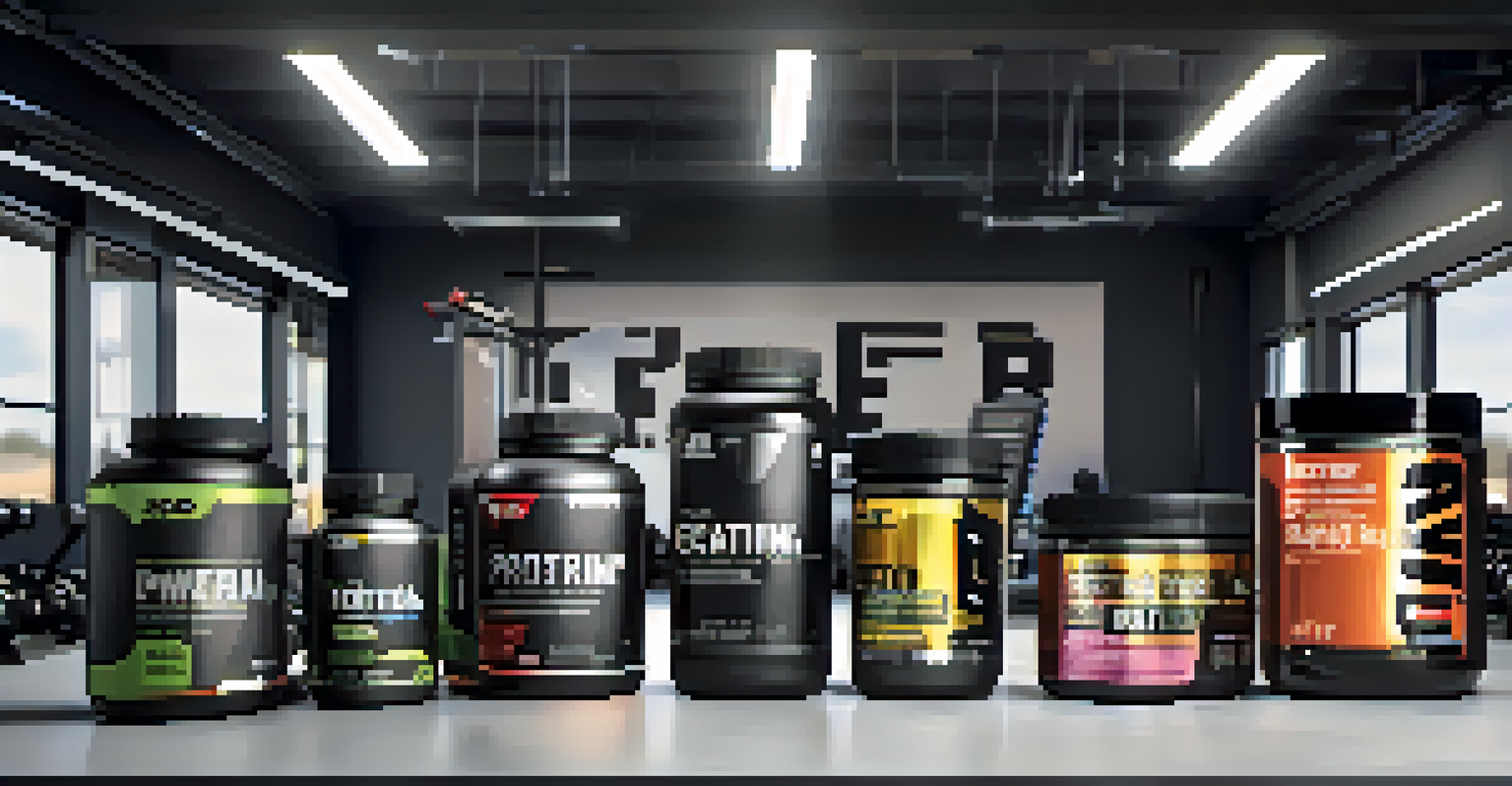The Myth of 'Clean Eating' in Powerlifting Nutrition

Understanding 'Clean Eating' in Powerlifting
Clean eating is often touted as the ultimate approach to nutrition, emphasizing whole foods and minimal processing. In the world of powerlifting, where strength and performance are key, this concept can be misleading. While whole foods are undoubtedly beneficial, the term 'clean eating' suggests a binary view of food that can create unnecessary stress and confusion among athletes.
Let food be thy medicine and medicine be thy food.
Powerlifters require a specific balance of macronutrients—proteins, fats, and carbohydrates—to fuel their workouts and aid recovery. The pressure to adhere to a 'clean' diet can lead to restrictive eating patterns that may hinder progress rather than help. It's important to recognize that all foods can fit into a well-rounded diet, even those typically labeled as 'unclean.'
Instead of focusing solely on the cleanliness of food, powerlifters should prioritize nutritional value and how various foods contribute to their overall goals. By understanding the nuances of nutrition beyond the clean versus dirty debate, lifters can make more informed choices that support their performance.
The Role of Flexibility in Powerlifting Nutrition
Flexibility in nutrition is crucial for powerlifters, as it allows for a more sustainable approach to eating. Rigid diets that strictly adhere to clean eating can lead to feelings of deprivation, making it challenging to maintain long-term. By incorporating a variety of foods, including those that might not fit the 'clean' label, lifters can enjoy their meals while still meeting their nutritional needs.

For instance, a powerlifter might enjoy a slice of pizza post-workout without guilt, knowing that it contributes to their overall calorie and carbohydrate intake. This flexibility can enhance mental well-being and make training more enjoyable. A balanced approach fosters a healthier relationship with food, encouraging athletes to view nutrition as a tool for performance rather than a set of rules to follow.
Flexibility in Powerlifting Nutrition
Powerlifters benefit from a flexible approach to nutrition that allows for a variety of foods, enhancing enjoyment and adherence.
Moreover, allowing for occasional indulgences can prevent binge eating or feelings of guilt associated with certain foods. By embracing a flexible mindset, powerlifters can create a nutrition plan that is both effective and enjoyable, ultimately leading to better adherence and results.
Debunking the Clean Eating Mentality
The clean eating mentality often leads to misconceptions about certain food groups, like carbs and fats. Many powerlifters might fear these macronutrients, believing they will derail their progress. However, both carbohydrates and fats play essential roles in energy production and recovery, making them vital for any athlete's diet.
You can’t out-exercise a bad diet.
For example, carbohydrates are the body's primary source of energy, especially during high-intensity workouts. Powerlifters need adequate carb intake to fuel their lifts and aid in muscle recovery. Similarly, healthy fats are crucial for hormone production and overall health, proving that balance, rather than strict categorization, is key.
By debunking the clean eating mentality, powerlifters can focus on incorporating a variety of foods that support their performance goals. This shift in perspective allows for a more inclusive diet that emphasizes nutrition quality over arbitrary labels.
The Importance of Caloric Intake for Lifters
When it comes to powerlifting, caloric intake often trumps the clean versus dirty debate. Powerlifters need to consume enough calories to support their training intensity and recovery. Focusing solely on clean foods may lead to under-eating, which can negatively impact strength gains and overall performance.
For instance, if a lifter is struggling to meet their calorie needs with only whole foods, they might overlook the benefits of calorie-dense options. Incorporating foods like nut butters, whole grains, and even some processed snacks can help achieve caloric goals without excessive volume. It's about finding the right balance that aligns with individual needs and preferences.
Importance of Caloric Intake
Prioritizing caloric intake over strict clean eating helps powerlifters meet their energy needs and improve performance.
Ultimately, powerlifters should prioritize their total caloric intake, ensuring it aligns with their training demands. By recognizing that all foods can contribute to their energy needs, they can create a more effective and enjoyable nutrition strategy.
Mindset Matters: Nutrition and Performance Connection
The connection between mindset and nutrition is often overlooked in powerlifting. How lifters perceive their food choices can significantly impact their performance and training outcomes. A positive relationship with food, devoid of guilt or anxiety, can lead to better focus and motivation in the gym.
For example, when powerlifters view food as fuel rather than a source of restriction, they are more likely to make choices that support their goals. This mindset encourages experimentation with different foods and meal plans, allowing athletes to discover what works best for their bodies. A relaxed attitude towards eating can lead to improved mental clarity and performance.
By fostering a healthy mindset around nutrition, powerlifters can enhance their overall experience in the sport. This connection between mental well-being and food choices is vital for long-term success, making it essential for athletes to prioritize their mental approach as much as their physical training.
The Role of Supplements in Powerlifting Nutrition
Supplements can play a beneficial role in powerlifting nutrition, especially when whole food sources fall short. While clean eating advocates may promote a strict whole-foods-only approach, it's essential to recognize that supplements can help fill nutritional gaps. For instance, protein powders can offer a convenient way to meet protein needs without excessive meal prep.
Moreover, certain supplements, like creatine and branched-chain amino acids (BCAAs), have been shown to enhance performance and recovery. These can be particularly useful for powerlifters who push their limits in training. The key is to choose high-quality supplements that complement a well-rounded diet rather than replacing it.
Mindset Matters for Lifters
A positive relationship with food enhances focus and motivation, ultimately leading to better performance in powerlifting.
Integrating supplements into a nutrition plan allows powerlifters to optimize their performance without getting caught up in the clean eating myth. By treating supplementation as an addition to a balanced diet, lifters can ensure they meet their specific nutritional requirements.
Finding Balance: The Key to Powerlifting Nutrition
Finding balance in powerlifting nutrition is essential for long-term success. Rather than adhering to a strict clean eating regimen, athletes should focus on creating a diverse and enjoyable diet. This not only supports physical performance but also promotes mental well-being and sustainability in their nutrition approach.
Incorporating a wide range of foods—from whole grains and lean proteins to occasional treats—allows powerlifters to enjoy their meals while still meeting their nutritional goals. This balanced approach can lead to better adherence, making it easier for lifters to stick to their nutrition plans over time.

Ultimately, embracing balance in nutrition means recognizing that food is not just fuel but also a source of enjoyment and connection. By stepping away from the clean eating myth, powerlifters can cultivate a healthier relationship with food that supports their performance and overall quality of life.